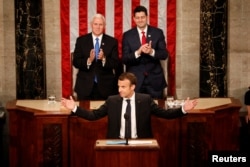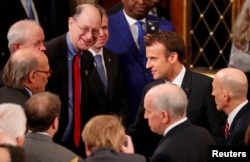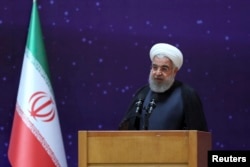French President Emmanuel Macron said Wednesday he believes U.S. President Donald Trump will pull the United States out of the Iran nuclear deal with Tehran to restrain its nuclear weapons development.
"I don't know what the American decision will be but the rational analysis of all President Trump's statements does not lead me to believe that he will do everything to stay in the JCPOA [Iranian nuclear deal]," Macron told a news conference at the conclusion of his three-day state visit.
Asked if such a decision would indicate a personal failure, Macron said his role was not to convince Trump to "walk away from campaign commitments, but rather to prove that the agreement makes sense.
Earlier Wednesday, Macron urged U.S. lawmakers to ensure the United States does not to abandon the Iran nuclear deal.
"Iran shall never possess nuclear weapons, not in five years, not in 10 years, never," Macron declared in a ringing , 49-minute speech to both chambers of the U.S. Congress.
Trump is set to decide next month whether to renew sanctions relief for Iran. The agreement lifts sanctions on Tehran in exchange for limits on the country's nuclear development.
The U.S. president called the agreement "insane" and "ridiculous" and has threatened to withdraw from it.
Instead Macron, as he did in talks with Trump on Tuesday, called for negotiations for a new agreement with Iran over Tehran's ballistic missile tests and military involvement in Syria, Yemen, Lebanon and Iraq.
Lawmakers from both chambers cheered robustly as Macron praised America’s history of multilateralism, saying Europe and the United States must together face the "new threats and challenges" of the 21st century.
"We can choose isolationism, but it will not stop the evolution of the world," he said. Western allies cannot let nationalistic impulses take over and "undermine the liberal order we set after World War II. It is a critical moment," said Macron.
"I thought on balance his speech was right on target and he had the courage not to trim on issues which he thought were important," House Minority Whip Steny Hoyer told reporters shortly after the speech.
Rep. Chris Collins, a Republican from New York and the first member of Congress to endorse Trump in 2016, told VOA he saw Macron’s comments as a positive step in addressing the problems with the Iran nuclear deal.
"Now that we've got France saying yeah, we can negotiate a better deal — I think that's in response to Trump's position," Collins said Wednesday.
But Iranian President Hassan Rouhani on Wednesday rejected the idea of a new deal or any changes current pact negotiation by the Obama administration and Britain, Germany, Russia, China, France.
Trump stands alone among the signatories to the Iran deal in opposing it.
"He's a businessman," University of Denver international affairs professor Jonathan Adelman told VOA. "For him, what you put forth at first is not necessarily what you get at the end."
Adelman said Macron did well in his speech, and that he thinks the most likely path forward is a supplemental agreement to the original nuclear deal.
The French president also pressed lawmakers to support a return to the Paris Climate Agreement, saying "there is no Planet B."
Trump withdrew from the accord in 2015, following an intense effort by the Obama administration to strike the sweeping agreement.
"I'm sure one day the U.S. will come back again to join the Paris agreement," Macron predicted.
Congressional correspondent Katherine Gypson, Ken Bredemeier and Victor Beattie contributed to this report.









